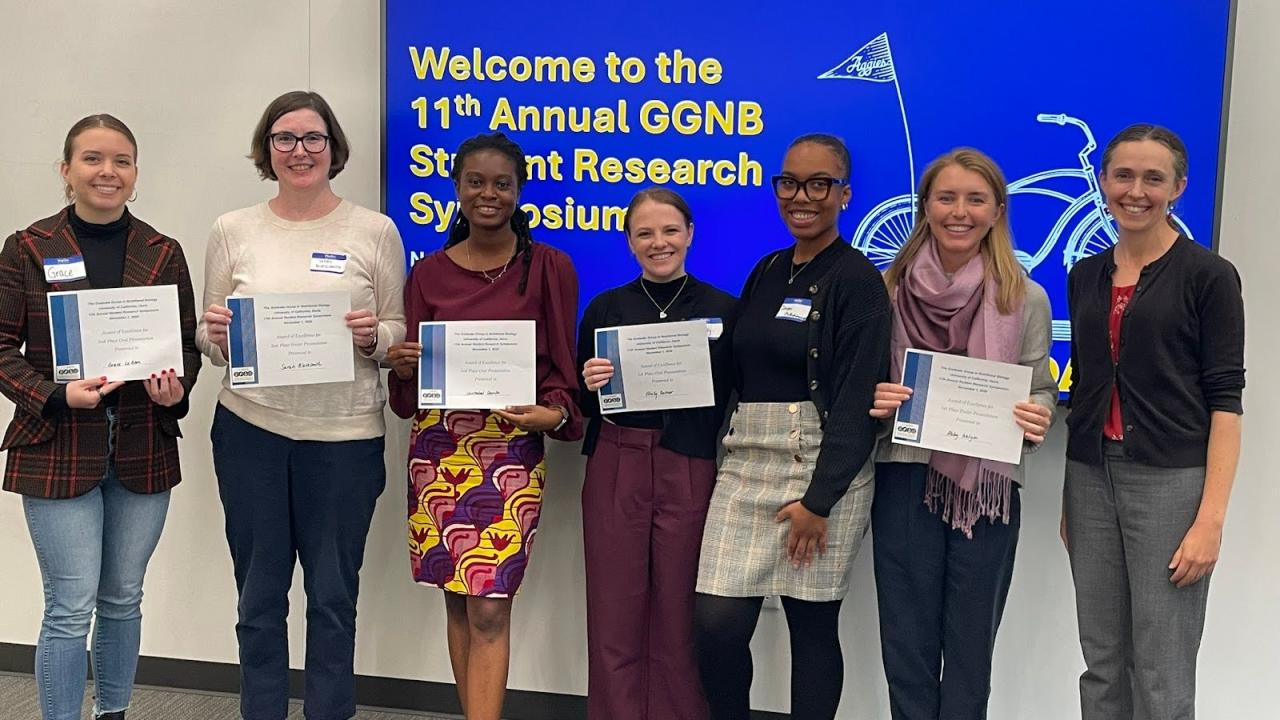
11th annual GGNB Research Symposium
Source: https://ggnb.ucdavis.edu/
Authors: Henry Pao & Jessie Xu, UC Davis undergraduate nutrition majors
The 11th Annual Graduate Group in Nutritional Biology (GGNB) Research Symposium showcased a wide array of groundbreaking studies that push the boundaries of nutritional science. From food security to gut microbiome health, researchers presented innovative solutions to global and local nutritional challenges.
A Glimpse Into Nutritional Innovations: Research Highlights from the GGNB Research Symposium
Tailoring Food Fortification
Emmanuel A. Gyimah from Dr. Reina Engle-Stone's research group presented findings on how data sources influence design of food fortification strategies in Cameroon, Nigeria, and Senegal. Their research highlighted the variability in recommended wheat flour fortification levels based on data from dietary recall, household surveys, and FAO Food Balance Sheets, emphasizing the importance of appropriate data for impactful public health interventions.
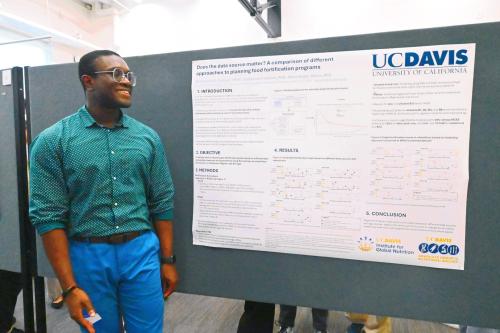
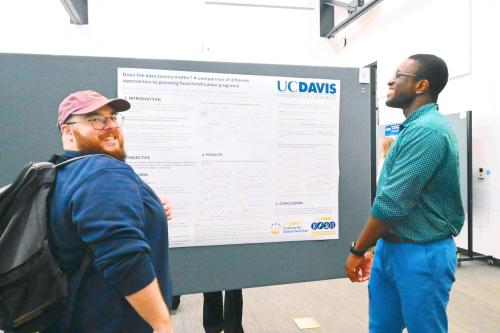
Early Nutrition and Long-Term Behavior
Jonnatan Fajardo, part of Dr. Christine P. Stewart's lab, explored how small-quantity lipid-based nutrient supplements (SQ-LNS) provided during early life influence adolescent physical activity. While SQ-LNS showed positive effects in early childhood, the longer-term impact on physical activity and sedentary behavior appeared negligible, offering insights into the temporal nature of impacts of nutritional interventions.
Reimagining Cardiovascular Health
Mengjiang Huang, from Dr. John W. Newman's team, discussed the relationship between LDL composition and atherosclerosis in a mouse model. Their research pinpointed specific LDL lipids with anti-inflammatory properties, suggesting potential avenues for targeted cardiovascular therapies. Similarly, Abigail A. Lutz, guided by Dr. Francene Steinberg, demonstrated the superior vascular benefits of high-polyphenol olive oil compared to its low-polyphenol counterpart, underscoring the critical role of olive oil polyphenols in heart health.
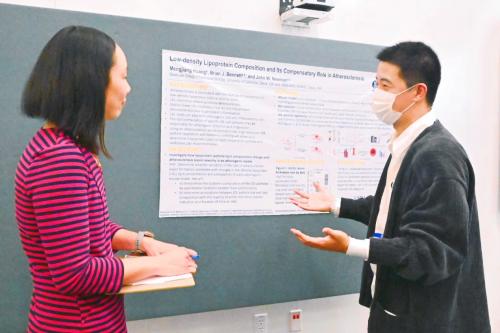
The Power of Fiber and Grapes
Shannon H. Trinh from Dr. Francene Steinberg’s group presented findings on how grape powder consumption enhances gut microbiota diversity and cardiovascular health, reinforcing the potential of this food for health promotion.
Early Life Nutrition and Breastfeeding
Abigail M. Galyon from Dr. Carolyn M. Slupsky's lab linked maternal pre-pregnancy BMI to differences in human milk metabolites such as taurine and creatine. These findings highlight the interplay between maternal health and infant development, offering pathways to optimize nutrition during early life.
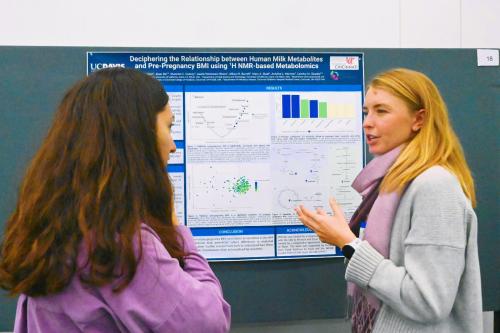
Improving Food Security and Nutrition Education
In another study, Emily Sklar from Dr. Debbie Fetter’s group found that a college-level nutrition course improved students’ cooking confidence and diet quality, though its impact on food security behaviors was limited. These projects emphasize the role of education and accessibility in addressing food insecurity.
Beef and Micronutrient Absorption
Hareem Zahid, part of Dr. Carl Keen's research team, showcased the benefits of daily beef consumption in enhancing zinc absorption and reducing blood pressure in older adults. This study challenges the prevailing narrative on plant-based diets, highlighting beef’s potential role in cardiovascular and micronutrient health.
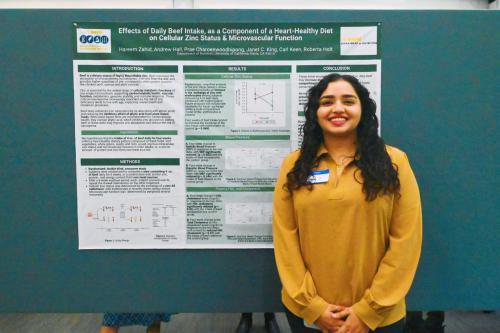
The Importance of Infant Diet Quality
Alana M. Chaney, mentored by Dr. Lauren E. Au, linked higher infant diet quality scores to better nutrient intakes and reduced ultra-processed food consumption in early childhood. This underscores the lifelong importance of fostering healthy dietary habits from infancy.
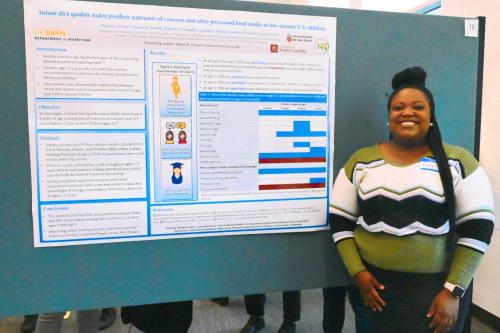
Understanding the Relationship Between Food Security and College Student Food Preferences
Melissa J. Teuber, guided by Dr. Debbie Fetter, conducted a pilot study on food security and preferences among UC Davis undergraduates. The research revealed that students with lower food security prioritized price and convenience more than their food-secure peers, emphasizing how financial and practical constraints shape food choices. These findings underscore the need for targeted strategies to address food insecurity on college campuses, considering both economic and personal factors.
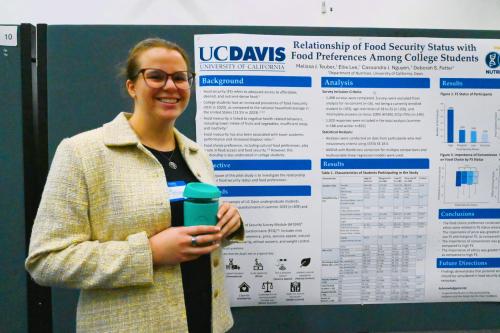
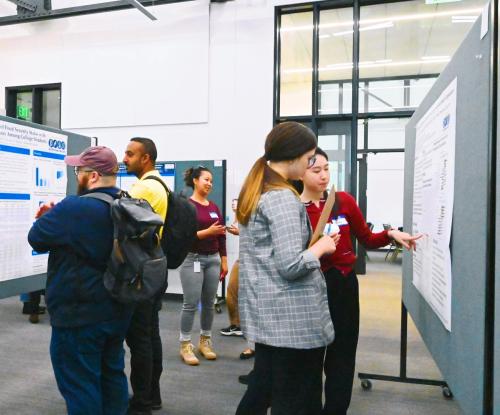
Oral Presentations
There were 6 oral presentations covering different topics in this year's GGNB Research Symposium:
- Kari Melander: “Genetic Background Modulates Diet’s Influence on Hepatic Steatosis”
- Christabel Domfe: “Harnessing Artificial Intelligence to Improve Dietary Intakes of UC Davis Students”
- Yirui Tang: “Association of Lactose Intake and Lactase Persistence Genotype with Microbial Taxa and Function in Healthy U.S. Adults”
- Jazmin Machuca: “Nutritional Modulation of Diet-Induced Obesity on Intestinal Barrier Dysfunction: Implications for Pancreatic Carcinogenesis”
- Grace LeBleu: “Interactome Mapping of Protein Tyrosine Phosphatases in Insulin-Stimulated Glomerular Podocytes”
- Emily Becher: “Household use of multiple micronutrient-fortified bouillon cubes improves language and gross motor development among children 2-5 years of age in northern Ghana”
The 11th annual GGNB Student Research Symposium proudly featured Dr. Brooke Wickman (PhD ’24) as its plenary speaker for her talk, “Beyond the Bedside, Beyond the GGNB.” Dr. Wickman is currently a postdoctoral scholar in Dr. Susan Brown’s Lab at the UC Davis School of Medicine, specializing in implementation and health systems science to promote nutrition and health equity. During her time as a GGNB student, she served as President of GradSAC and was a fellow in the prestigious Professors for the Future program. Her work has earned recognition, including being a finalist for the American Society for Nutrition Clinical Emerging Leader Award and was a winner in the Emerging Leaders in Nutrition Science poster competition.
Her presentation started off presenting a study where she developed and evaluated a DASH diet medical nutrition therapy intervention for outpatient heart failure management and patients in a cardiology clinic. Findings of the study found that fiber intake increased after three months and patients reported significant improvements in their perceived health status. Additionally, promising trends and supportive evidence suggest the potential for refining the intervention and scaling it beyond the pilot phase. Brooke concluded with reflections on the role of implementation science in accelerating the translation of nutrition research to practice and how her doctoral studies with the GGNB prepared her for a career in this area.
The symposium concluded with announcing the winners of the poster and oral sessions. In the poster presentations, Abby Galyon from the Slupsky Research Group earned first place, followed by Sarah Blecksmith from the Lemay Research Group in second place, and Jonn Fajardo from the Stewart Research Group in third. For the oral presentations, Emily Becher from the Engle-Stone Research Group claimed first place with her impactful talk, while Grace LeBleu from the Haj Research Group and Christabel Domfe from the Au Research Group secured second and third places, respectively. These winners exemplify excellence in research dissemination and engagement.
